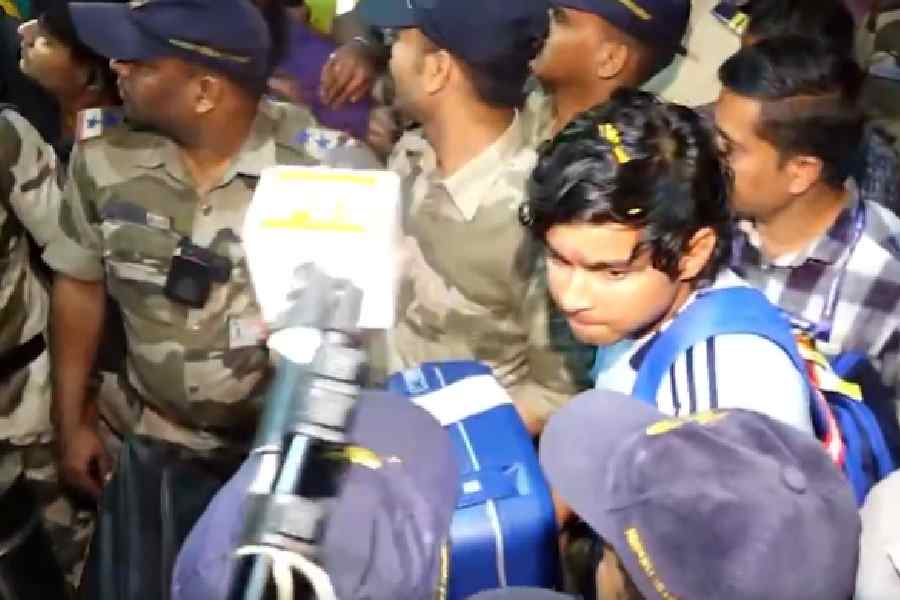New Delhi, May 31: Mumbai police have spoken of seeking legal opinion on the possibility of bringing belated murder charges against former nurse Aruna Shanbaug's attacker but legal experts this newspaper contacted have ruled the idea out.
Sohanlal Bhartha Valmiki, whose 1973 assault sent Aruna into a permanently vegetative state till her death on May 18 this year, was convicted of robbery and an attempt to murder and sentenced to seven years.
He disappeared after his discharge in 1980 but following the former nurse's death, has been traced by some enterprising journalists to a western Uttar Pradesh village.
The legal experts who spoke to The Telegraph cited two grounds why prosecuting Valmiki, now aged about 70, for murder would be pointless if not impossible:
Delay: Aruna's death from pneumonia-related complications prima facie precludes the murder charge, and the gap of 42 years is too long for any prosecutor to argue that her death was a consequence of the attack.
Double jeopardy: Both the Constitution and the Criminal Procedure Code (CrPC) say that a person cannot be prosecuted and punished twice for the same offence, or a related offence flowing from the same criminal act.
Aruna's death - and fresh media reports on the assault and her bleak existence - has stoked public emotions and triggered calls for stricter punishment for Valmiki, seen to have got off lightly. A minister and officers in Mumbai have pledged to explore whether they can get Valmiki tried for murder.
"It will be very difficult for the prosecution to prove that (Valmiki) was responsible for the death," senior criminal lawyer Sushil Kumar said, "because there is no proximate cause".
He explained that an accused cannot be held liable for purported consequences taking place after 42 years.
"If a victim dies after a few days or months, you can alter the charge from Section 307 of the Indian Penal Code (attempt to murder) to 302 (murder) - but not after four decades, because the cause of death should be proximate," Kumar said.
"Although there is no time limit for altering the sections, courts decide such questions on a case-to-case basis."
Fellow advocate B.P. Singh Dhakray cited a further ground - the doctrine of double jeopardy - why Valmiki cannot be pinned with murder.
Article 20(3) of the Constitution says: "No person shall be prosecuted and punished for the same offence more than once."
To this, Section 300 of the CrPC adds that a person cannot be tried twice for the same offence whether he was convicted or acquitted the first time. Nor can he tried "on the same facts for any other offence for which a different charge from the one made against him might have been made".
Section 221 of the CrPC clarifies the point of "different charge" from "same facts", which relates to cases where it might initially appear "doubtful" which offence was constituted by a particular act.
For example, it may be unclear whether an accused should be charged with "theft, or receiving stolen property, or criminal breach of trust or cheating". In such cases, if he's charged with only theft and acquitted or punished, he cannot later be tried again for receiving stolen property based on the same facts.
"Even elsewhere in the world, no person has been so tried - leave alone convicted - for an aggravated offence, particularly after he had already served a sentence of seven years," Dhakray said.
Rape trial?
Valmiki, who was a sweeper in the hospital where Aruna worked, had allegedly raped her while partially strangulating her with a dog chain, cutting off oxygen to the brain - which led to her vegetative state.
However, at the request of her family and then fiancé, rape charges were not brought.
Can Valmiki be tried for rape now?
Not likely, the legal experts said, considering the length of time passed and lack of evidence - which went uncollected at the time because rape charges hadn't been pressed.
However, the protection of double jeopardy would not extend to rape in Valmiki's case, the experts said, because the immunity to "different charge" from "same facts" applies only to related/alternative offences and not to distinct ones.
A five-judge Constitution bench of the Supreme Court had made this clear in 1960, allowing two accused - already tried for an insurance act-related offence - to be tried again for a distinct offence under the same law.
What needed to be compared were the ingredients of the two offences, the court said.
Again, in February 2009, the apex court rejected the "double jeopardy" plea of an accused who, after serving a sentence in America for selling narcotics, was tried again in Mumbai after deportation.
The apex court ruled that the US charge was "of conspiracy to possess" a banned substance "with the intention of distributing" it whereas the Indian charge related to importing the substance from Nepal and exporting it to other countries.
They are "distinct and separate", the court said.











